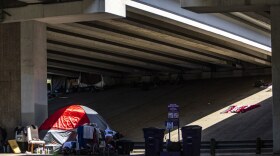The Austin City Council OK'd a measure that could effectively bring back targeted bans on camping in public.
Council Member Ann Kitchen's plan, known as the HEAL Initiative, asks City Manager Spencer Cronk to identify encampments in dangerous locations, provide resources to move people there into housing and then suggest policies to prohibit camps at those sites.
Council members Mackenzie Kelly, Leslie Pool, Pio Renteria and Kathie Tovo all co-sponsored the item. It passed 8 to 3, with Mayor Pro Tem Natasha Harper-Madison joining council members Vanessa Fuentes and Greg Casar in voting against it.
Kitchen maintains the plan would not recriminalize encampments, which have largely been permitted in public spaces under controversial city ordinances adopted in 2019. She says the city would not rely on law enforcement or ticketing to enforce any prohibition.
"I do not believe it is kind, I do not believe it is humane to allow places that pose health and safety risks to remain available for camping."Council Member Ann Kitchen
Still, the initiative does single out areas where bans could be reinstated. During discussion over the last two weeks, encampments at 183 and Ohlen Road, Ben White Boulevard and Pack Saddle Pass, West Cesar Chavez Street along Lady Bird Lake and those under I-35 throughout downtown have all been mentioned as potentially high-risk sites under the initiative.
Ahead of the vote, Kitchen touted the plan's focus on housing: It sets aside $3 million to help house residents of the sites. She conceded, however, that it wasn't a panacea to solve homelessness, merely an effort to get people out of potentially dangerous situations.
"I really believe fundamentally that we owe our unhoused neighbors protection from living in unsafe places – just as we do for our housed community," she said. "I do not believe it is kind, I do not believe it is humane to allow places that pose health and safety risks to remain available for camping."
After an initial round, the plan would repeat the process of ID'ing camps, finding housing and banning camping in two additional phases.
Scores of Austinites testified against the plan before the vote. Of the 141 people who signed up, only eight voiced support for it, while 14 were neutral and 119 were against it, according to the city.
Casar offered a handful of amendments, including one that would more definitively take reinstatement of bans off the table. He argued the existing rules already ban camping or resting in a manner that's dangerous or threatens public health or safety.
"If we're communicating to the community that we are not trying to expand criminalization but we are actually just going to house people and make folks be in safe places, then we wouldn't need to bring back an ordinance," he said.
Mayor Steve Adler, Fuentes, Casar and Harper-Madison supported the amendment, but it was ultimately voted down.
The OK came shortly after the city clerk certified a petition that could ultimately put the city's homelessness ordinances on the ballot in May.
City Manager Cronk is scheduled to present the next possible steps to Council at its March 4 meeting.
Got a tip? Email Andrew Weber at aweber@kut.org. Follow him on Twitter @England_Weber.
If you found the reporting above valuable, please consider making a donation to support it. Your gift pays for everything you find on KUT.org. Thanks for donating today.









